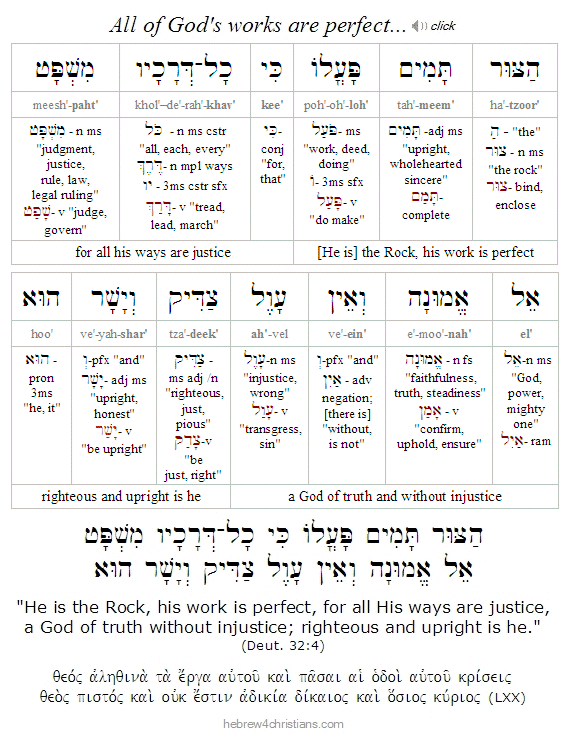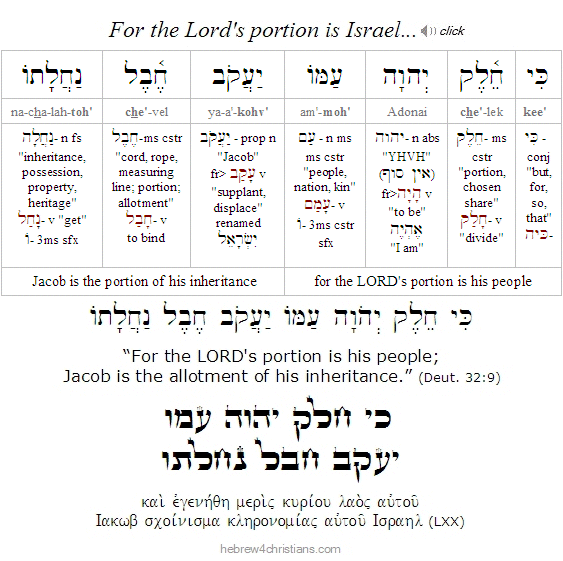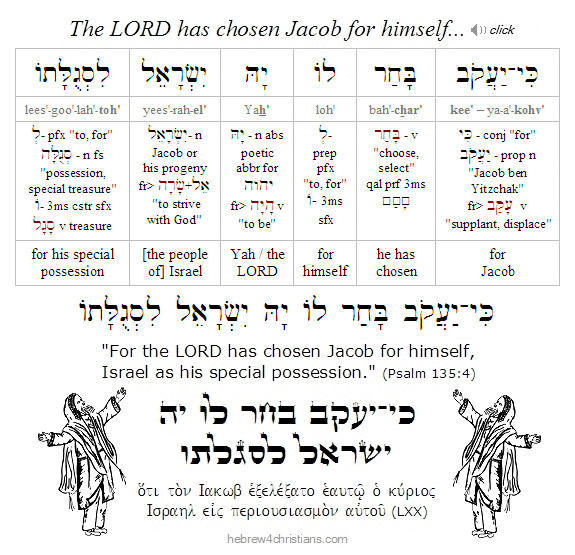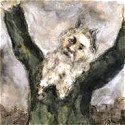|
Moses was a truly great prophet, and the Ha'azinu is an oracle that encompasses the past, present, and the future redemption of Israel - including the world to come and the coming reign of the Messiah. Indeed, the words of the later prophets, especially Jeremiah and Isaiah, essentially echo the message of Moses' prophetic song.
There are many profound insights to be gleaned from Moses' last words given to Israel. For example, when Moses stated, "I will proclaim the name of the LORD; ascribe greatness to our God" (Deut. 32:3), we learn that we must examine our hearts to be sure that reverence and awe are within us lest we take the Name in vain or regard it as "profane" (i.e., common). The central idea here is kavanah - "concentration" - and the intention to honor the LORD. Indeed, because of this verse the ancient sages always hesitated before mentioning God's Name, and the custom of saying "Hashem" or "Adonai" became a common practice...
Moses goes on to describe the LORD as "the Rock" (i.e., ha'tzur: הַצּוּר) whose ways are perfect and whose judgments are sound. The LORD is the "God of Faith" (אֵל אֱמוּנָה) who abhors iniquity; all He does is righteous and true:
הַצּוּר תָּמִים פָּעֳלוֹ כִּי כָל־דְּרָכָיו מִשְׁפָּט
אֵל אֱמוּנָה וְאֵין עָוֶל צַדִּיק וְיָשָׁר הוּא
ha·tzoor tah·meem poh·oh·loh, kee khol-de·rah·khav meesh·paht
El e·moo·nah ve·ein ah·vel, tzad·deek ve·yah·shar hoo

"The Rock, his work is perfect, for all his ways are justice.
A God of faithfulness and without iniquity, just and upright is he."
Deut. 32:4


The metaphor that God is "the Rock" emphasizes God's permanence and strength - that He is the very "bedrock" of our existence. The Talmud (Berachot 10a) notes that "rock" (צוּר) shares the same root as "artist" (יוֹצֵר), and therefore identifies God as the Ultimate Artist of reality. Indeed, the verb yatzar (יָצַר) means to fashion or shape (Gen. 2:7). Interestingly, the word "rock" first appears in the Torah when Moses was instructed to strike the rock to produce living water (Exod. 17:6). When Moses later sinned by striking the Rock instead of regarding it as the "Living Rock" (i.e., Messiah), he lost access to the promised land. The Apostle Paul identifies this Rock as none other than Yeshua (1 Cor. 10:4).
Another gem concerns the contrast between Israel and the nations, and how Israel is called am naval ve'lo chacham (עַם נָבָל וְלא חָכָם), a "foolish and unwise people" (Deut. 32:6). Later Moses will make a wordplay based on this phrase, but for the moment he contrasts the blessing and benefits given to Israel and is scandalized by the apostasy he later foresees. The people have forgotten God, their Father and Creator, "the One who made and established you," and Moses counsels Israel to "remember" and "ponder" how God administered retribution in previous generations for the sins of the people. For example, he destroyed the world with the great flood in Noah's time, and later scattered the nations in judgment upon the inhabitants of ancient Babylon (i.e., the tower at Shinar). The Israelites were to remember their special calling and identity as God's chosen people:
בְּהַנְחֵל עֶלְיוֹן גּוֹיִם בְּהַפְרִידוֹ בְּנֵי אָדָם
יַצֵּב גְּבֻלת עַמִּים לְמִסְפַּר בְּנֵי יִשְׂרָאֵל
כִּי חֵלֶק יְהוָה עַמּוֹ יַעֲקב חֶבֶל נַחֲלָתוֹ
be·han·chel El·yohn goy·eem, be·haf·ree·toh be·nei ah·dam
ya·tzev ge·voo·loht a·meem, le·mees·pahr be·nei Yees·rah·el;
kee che'·lek Adonai am·mo, Ya·a·kohv che'·vel na·cha·lah·toh

"When the most High divided to the nations their inheritance, when he separated
the sons of Adam, he set the bounds of the nations according to
the number of the children of Israel. For the LORD'S portion is his people;
Jacob is the rope of his inheritance" (Deut. 32:8-9)
 |
When the Most High divided the nations, he "established their boundaries according to the number of the sons of Israel," though he gave to Israel his "chosen orchard" and the "treasures" that may be reaped in it.
The midrash comments. A king had many sons from different concubines but only one son from his queen. He loved the latter very much. When he divided his possessions, he gave fields and vineyards to the sons of the concubines, but to the son of the queen, he gave only one orchard. However, that orchard was unique, and all of the king's treasures were hidden within it. The son was not aware of the uniqueness of his gift and complained to his father, questioning why the inheritance given to him was less than that given to the others. The king took him aside and explained to him all the treasures that could be reaped from it.
Israel inherited God's own special portion of the earth, which is considered the highest (or most central) location in the world. That is why Zion is God's holy and great mountain that one day will fill the entire earth (Isa. 2:3).
Among the nations, God chose Israel for himself, meaning that he imparted additional revelation to the Jewish people. The phrase chevel nachalato (חֶבֶל נַחֲלָתוֹ), often translated as "his allotted heritage," literally means the "rope of his inheritance," which indicates the special bond between the LORD and Israel. Note that many Christian translations change the meaning of these verses by relying on the ancient Greek translation of the Torah (i.e., the Septuagint) over the Hebrew, often substituting "sons of gods" or "angels" for the Hebrew text "sons of Israel."
Hebrew Lesson:
 |
|






